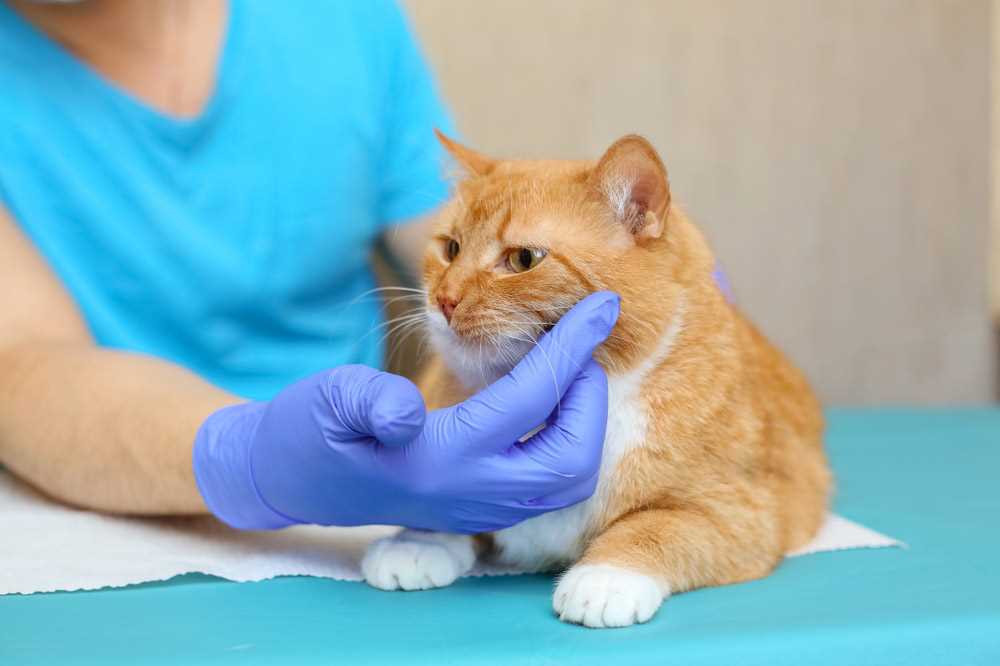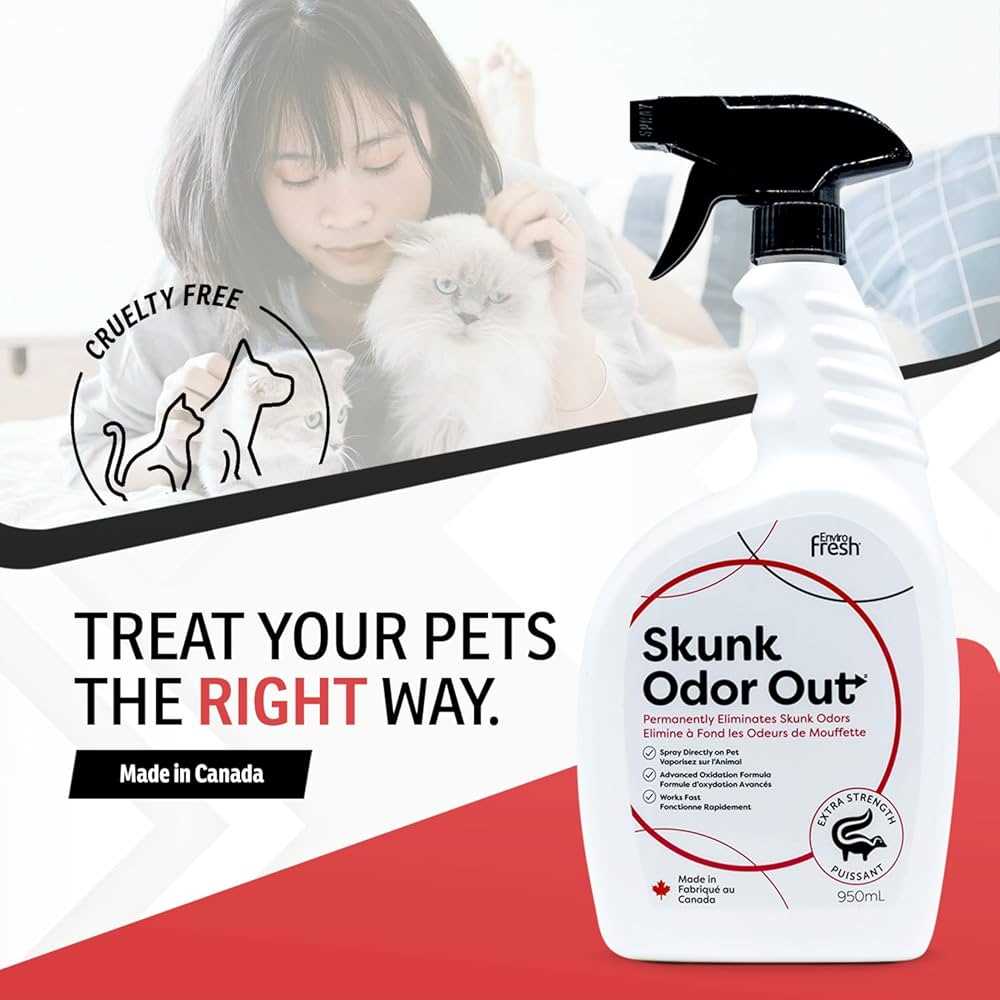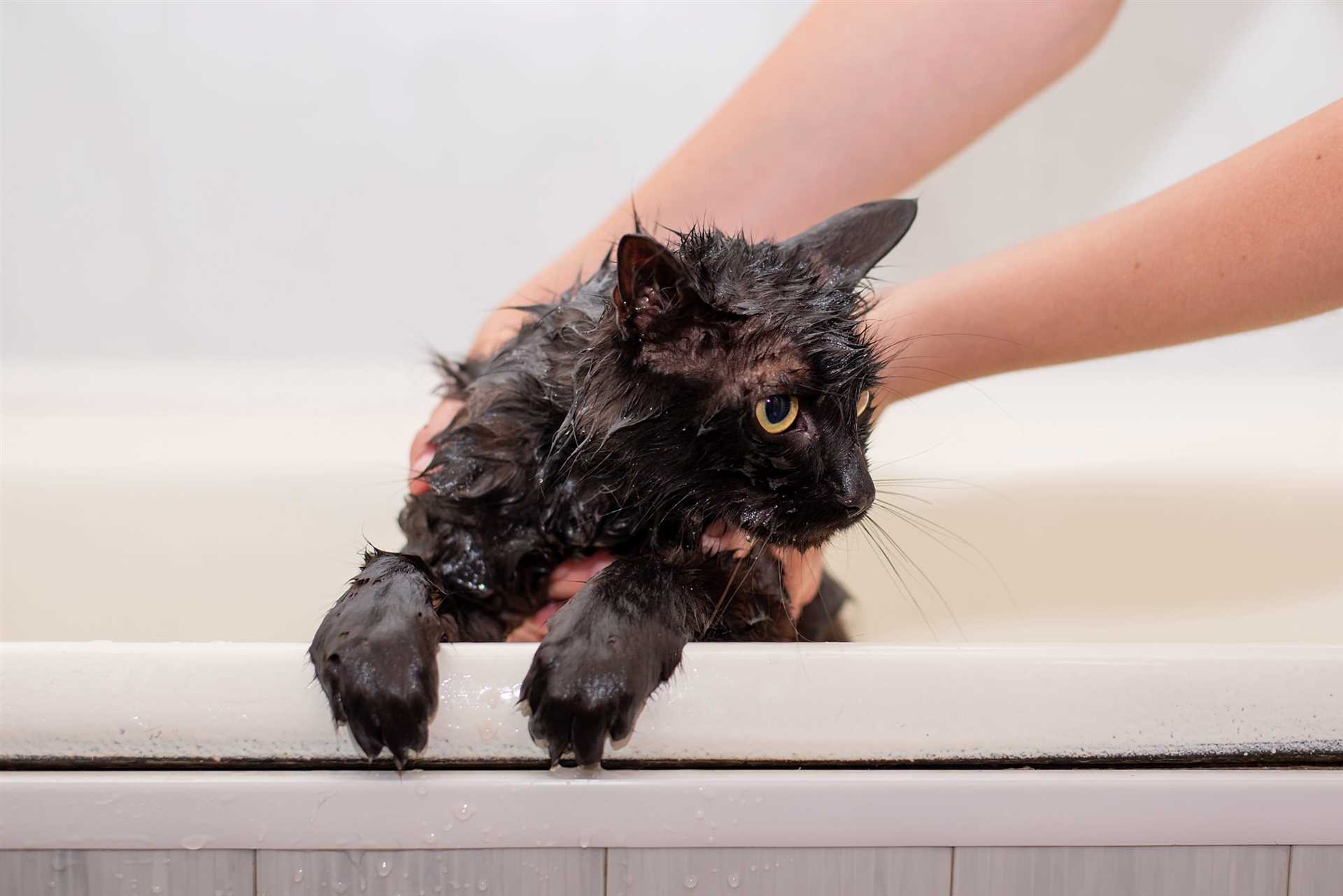

First, mix a solution of one part white vinegar and one part water in a spray bottle. This mixture helps neutralize strong odors effectively. Apply it directly to the affected areas of fur, avoiding the eyes and nose, and let it sit for about five minutes before rinsing with warm water.
Next, create a paste using baking soda and water. Apply this paste to the fur where the odor resides, allowing it to dry completely before brushing it out. Baking soda is a natural deodorizer, making it an excellent choice for tackling lingering scents.
Additionally, consider using a specialized enzymatic cleaner specifically designed for removing odors from pets. These products break down the odor-causing compounds, providing a thorough cleanse. Ensure to follow the instructions carefully for the best results.
Finally, keep your living space well-ventilated. Fresh air can help dissipate any remaining odors, so open windows or use fans to encourage airflow. Combining these methods will help restore freshness and comfort in no time.
Assessing the Severity of the Skunk Incident

First, check the areas affected by that pungent spray. If my fur is saturated, it indicates a more serious encounter. Gently sniff around to identify the concentration of the odor.
Next, observe my behavior. If I seem agitated, restless, or hiding, it suggests stress due to the incident. This reaction can help gauge how intense the experience was for me.
Consider the location of the encounter:
- If I was close to the source, the intensity will likely be higher.
- A brief interaction might mean less odor, while a direct hit indicates a more significant issue.
Evaluate the duration of exposure. A longer time in the vicinity increases the chances of a stronger scent lingering in my coat.
Lastly, check for any physical signs such as redness or irritation around my eyes or nose. These symptoms may require immediate attention and indicate that the experience was more than just olfactory distress.
Gathering Necessary Supplies for Deodorizing
Prepare a mixture of baking soda, hydrogen peroxide, and dish soap. This combination effectively neutralizes odors. Ensure you have the following items handy:
| Item | Purpose |
|---|---|
| Baking Soda | Absorbs odors and acts as a gentle abrasive. |
| Hydrogen Peroxide (3% solution) | Disinfects and helps break down the pungent compounds. |
| Dish Soap | Assists in cutting through oils associated with the odor. |
| Warm Water | Facilitates mixing the cleaning solution. |
| Soft Cloth or Sponge | Used for applying the solution gently. |
| Old Towels | For drying and absorbing any remaining moisture. |
| Plastic Gloves | Protect your paws from harsh chemicals. |
| Spray Bottle | Holds the solution for easy application. |
After gathering these supplies, you’ll be set to tackle the odor effectively. Make sure to keep everything organized to streamline the process.
Creating a Homemade De-skunking Solution
For tackling that lingering odor, a mixture of hydrogen peroxide, baking soda, and dish soap works wonders. Combine 1 quart of hydrogen peroxide (3%), 1/4 cup of baking soda, and 1 teaspoon of dish soap in a non-metallic container. This concoction neutralizes the pungent scent effectively.
Application Steps
Use gloves to protect your paws while applying the solution. Gently massage it into the fur, avoiding the eyes and mouth. Allow it to sit for about 5-10 minutes before rinsing thoroughly with warm water. Make sure to wash all the mixture out to prevent any irritation.
Post-Cleaning Care

After washing, dry your furry friend with a towel. If your feline is not a fan of baths, consider using a pet water fountain for cats to encourage hydration post-cleaning. This helps maintain their coat and skin health.
Bathing Your Feline Friend Safely and Comfortably
Choose a warm, quiet space for the bathing process. A bathtub or kitchen sink works well as long as it’s secure. Fill it with a few inches of lukewarm water, ensuring it’s not too deep for comfort.
Before introducing my fur to the water, I gently brush it to remove loose hair and mats. This also helps reduce any stress my human might feel when handling me later. Using a non-slip mat can help keep me steady during the wash.
When ready, use a gentle spray nozzle or a small cup to wet my fur, avoiding my face. It’s crucial to keep water away from my ears and eyes. A soft sponge can help with even soaking without overwhelming me.
Apply the homemade solution carefully, massaging it into my coat. This not only aids in cleaning but also feels soothing. Rinse thoroughly, ensuring no residue remains, as it could irritate my skin.
After rinsing, I appreciate a gentle towel wrap to help eliminate excess moisture. A warm, cozy spot is perfect for drying off and relaxing afterward. Never use a hairdryer; it can be too loud and frightening!
Lastly, rewarding me with a treat post-bath makes the whole experience more enjoyable, reinforcing positive feelings about bath time.
Post-Bath Care and Odor Prevention
After my wash, I recommend keeping my fur dry and free from lingering scents. Gently pat me down with a soft towel right after the bath. Avoid rubbing, as it may irritate my skin.
Once I’m mostly dry, a light brushing helps remove any remaining moisture and tangles. Using a slicker brush is ideal for my coat type. It also distributes natural oils, promoting a healthy shine.
Ensure my environment is fresh. Keep windows open to allow airflow, as it helps disperse any residual odors. Also, check my bedding; washing it regularly can prevent scents from lingering.
Regular Grooming
Establishing a grooming routine is beneficial. Regular brushing not only keeps my coat tidy but also reduces odors by removing dirt and debris before they settle in. Aim for a weekly session to maintain a clean and pleasant scent.
Diet and Hydration

What I eat affects how I smell. High-quality food supports my overall health and minimizes unpleasant odors. Ensure I have access to fresh water, as proper hydration is key to my well-being. This helps flush out any potential odor-causing substances.
Seeking Professional Help if Needed
In some situations, relying on experts might be the best choice. If the odor lingers despite your efforts, consider reaching out to a veterinarian or professional groomer.
- Veterinarians can examine for any irritation or injury caused by the spray.
- Groomers possess specialized products and techniques for effective odor removal.
- Emergency clinics may offer immediate assistance if your furry friend shows signs of distress.
Additionally, if your companion becomes overly anxious or agitated during the cleaning process, a professional can handle the situation with care and expertise. Take comfort in knowing that they have experience managing similar cases.
Before visiting, prepare a brief history of the incident, including how long ago it happened and any steps taken so far. This information can help the professionals understand the situation better.
For those curious about the digestion process, consider checking out this link: where does the chemical digestion of protein begin.
Ultimately, prioritizing your pet’s comfort and safety is key. If in doubt, don’t hesitate to seek help. Your companion deserves the best care possible.
FAQ:
What should I do immediately if my cat gets sprayed by a skunk?
If your cat gets sprayed by a skunk, the first step is to keep it calm and prevent it from rolling around or rubbing its face. Then, take your cat outside to avoid bringing the smell indoors. Use a mixture of hydrogen peroxide (3%), baking soda, and dish soap to create a cleaning solution. Apply this mixture to your cat’s fur, avoiding the eyes and mouth, and let it sit for about five minutes before rinsing thoroughly with warm water. This should help neutralize the odor significantly.
Are there any home remedies to remove skunk smell from my cat?
Yes, there are several home remedies that can help remove skunk smell from your cat. One popular method involves mixing tomato juice with water and applying it to your cat’s fur. Let it sit for about 10-15 minutes before rinsing it out. Another option is using a mixture of vinegar and water, which can also help neutralize the odor. Remember to be cautious around your cat’s eyes and mouth while applying these remedies.
How long will the skunk smell last on my cat if I cannot clean it right away?
If you cannot clean your cat immediately after it gets sprayed, the smell can linger for several days. Skunk spray contains oils that adhere to fur and skin, making it difficult to remove without proper cleaning. The longer the odor remains, the harder it may be to eliminate. It is best to clean your cat as soon as possible to minimize the duration of the smell.
Is it safe to use commercial pet odor removers on my cat after a skunk encounter?
While some commercial pet odor removers may be safe for cats, it is crucial to read the label carefully and ensure the product is specifically designed for use on pets. Avoid products containing harsh chemicals or fragrances, as they can irritate your cat’s skin. When in doubt, consult your veterinarian for recommendations on safe and effective cleaning products to use after a skunk encounter.
Can skunk smell harm my cat, or is it just an odor issue?
Skunk spray is primarily an odor issue, but it can cause irritation if it comes into contact with your cat’s eyes, nose, or mouth. In some cases, the spray can lead to temporary discomfort, such as tearing or sneezing. If you notice any unusual behavior or signs of distress in your cat after being sprayed, it’s advisable to consult a veterinarian for further evaluation.









